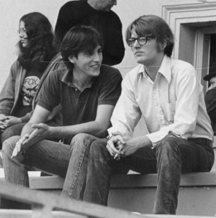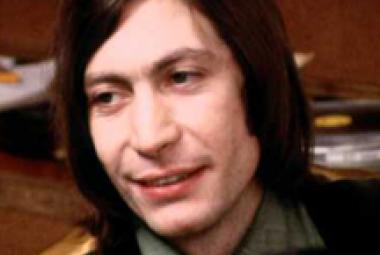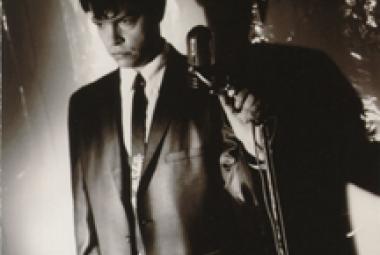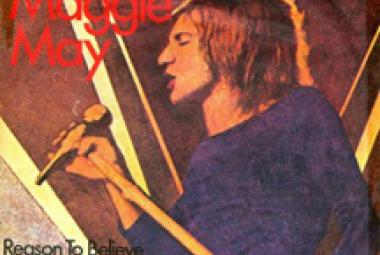Next
UNDER-APPRECIATED ROCK BAND OF THE MONTH FOR APRIL 2010: THE BREAKAWAYS
In the early 1970’s, when the concept-album craze, side-long classical-style keyboard exercises, and other similar pretensions in rock music started to run their course, many rock scribes began to search for redemption for popular music by a return to the carefree energy of the 1960’s. No one quite got it right as to what actually came to pass, but Greg Shaw – publisher of Mojo Navigator, Who Put the Bomp and other storied fanzines, some of which actually predated Rolling Stone – put his faith in what he called “power-pop”: teenage pop music in the standard 3-minute format but backed up with a hard-edged punk rock aesthetic. Pete Townshend coined the term power pop in a 1967 interview to describe the music that his band the Who and the Small Faces played; many of the Beatles’ mid-period singles are also in that style, such as “Paperback Writer” and “Day Tripper”. Among American bands, “Time Won’t Let Me” by the Outsiders and “Go All the Way” by the Raspberries are early power-pop hit songs.
By 1971, the term “punk rock” had already been applied retrospectively by Greg Shaw as well as Greil Marcus to American bands such as Question Mark and the Mysterians, the Standells, the Seeds, the Shadows of Knight and the Kingsmen who managed to score some hit songs during the height of the British Invasion. In 1972, Lenny Kaye popularized the term in the first definitive compilation album that he helped assemble for this music, called Nuggets: Original Artyfacts from the First Psychedelic Era, 1965-1968 ; his liner notes are almost as legendary as the double-album itself. (This music is now referred to as garage rock and psychedelic rock).
As it turned out, three competing and complementary strains of music arose seemingly overnight by 1974: In addition to power pop, they were what most of us know as “punk rock” – e.g., Ramones, Sex Pistols, Patti Smith Group (with Lenny Kaye on lead guitar), Dead Boys – and “new wave” – e.g., Elvis Costello, Blondie, Talking Heads, the Runaways – the latter band, the first successful all-female rock band, is now the subject of a major motion picture. Punk and new wave were almost interchangeable terms before long, and some of these bands definitely had a foot in both camps: The hotbed of punk rock in the early days was the CBGB club in New York City, but the house band there almost from opening night, Television (one of the great guitar bands) is now viewed as one of the earliest new wave bands, even though their original vocalist and bass player Richard Hell would leave the band to form one of the punkiest bands of the time, the Voidoids. Eventually the label “new wave” was applied to so many different kinds of musical artists that the term lost its meaning, and the same is true to a lesser extent of power pop. But it wasn’t like that in the beginning.
Unfortunately, the power-pop movement was somewhat overwhelmed by these other forces, but some marvelous records were pressed nonetheless with some success. In late 1974, Greg Shaw’s first release on his Bomp! Records record label were two tracks from 1972 album sessions by the Flamin’ Groovies that the band could not get anyone to release. The “A” side was “You Tore Me Down”, backed with a fine treatment of the old Paul Revere and the Raiders song “Him or Me”. As Shaw put it: “All I knew was that music this good had to come out. . . . And that’s as good a foot to start on as any, I reckon.”
In 1975, a band called the Nerves was formed as a true power trio: Jack Lee, Peter Case and Paul Collins were talented musicians as well as dynamite songwriters. They came up with an EP and a handful of singles that included a minor hit, “One Way Ticket”. The lead song on their EP, “Hanging on the Telephone” was gloriously covered by Blondie and became the opening track on their breakthrough album Parallel Lines. Rumor has it that someone put the Nerves EP on while the band was on their way to a gig, and the rest is history. “Heart of Glass” might have been their #1 hit song, but as the follow-up, “Hanging on the Telephone” reached #5 in the UK and ensured that Blondie would remain a force in rock music well into the 1980’s – in fact, they are still touring and recording good albums to this day. It wasn’t until 2008 that a proper retrospective album for the Nerves came out, called One Way Ticket – on the Bomp!-affiliated Alive Records label – that includes their recorded output as well as some additional related tracks, plus seven nice live tracks from a 1977 show.
The Nerves broke up due to the usual musical differences – not surprising considering that each member of the band was fighting to get their songs recorded – and THE BREAKAWAYS immediately formed. Basically it was just the duo of Peter Case and Paul Collins plus whatever guitar player or two that they could scrounge up to join the session; there were three different line-ups in the group in their short history. Their sound is sparer than that of the Nerves, but no less energetic for all that. One of their earliest tracks is also one of the best: “Walking out on Love” was part of the Nerves’ live show but had never been recorded by that band. Peter Case and Paul Collins worked through most of 1978 getting as many songs on tape as possible, along with a handful in the recording studio.
By the end of 1978, these two had also gone their separate ways, with Peter Case forming the Plimsouls and Paul Collins starting the Beat (later Paul Collins’ Beat). In early 1982, the Plimsouls released the quintessential power-pop song “A Million Miles Away”, and it was a bonafide FM hit before Geffen Records wrested the band away from Bomp! Records and pulled the song from the market until their album was finished. They recorded a couple of good albums for their label, and the Beat did the same, but it wasn’t what could have been. Jack Lee might have been the best songwriter of the three, but he retreated from the music scene after releasing just one solo album.
In 2009, tapes resurfaced of their early sessions that the Breakaways hadn’t even remembered that they had made, and Alive Records also put together a CD for this group called Walking out on Love: The Lost Sessions. Together with the Nerves CD, this album is being offered in a specially priced package with a brand new Alive CD of the Plimsouls at the top of their game playing live at the Whisky a Go Go in October 1981, called Live! Beg, Borrow & Steal. Highly recommended. Check it out at the Bomp! mailorder site: www.bompstore.com/breakaways-nerves-related-powerpop-walking-out-on-love-the-lost-sessions-cd/.
(April 2010)
* * *
* * *
Flashback: The Under-Appreciated Rock Band of the Month for April 2010 – THE BREAKWAYS
As I remember, I already had an article partially written on somebody else when an order from Bomp! Records came in that included a specially priced package of new CD’s by three related power-pop bands: the Nerves, the Plimsouls and the Breakaways. I already knew the Plimsouls’ hit “A Million Miles Away”, but just about everything else was a revelation, including the Nerves’ original version of “Hanging on the Telephone” that became Blondie’s follow-up hit after their monster “Heart of Glass”. I quickly checked Wikipedia and determined that the Breakaways did not have an article, so I dashed off a UARB post on them, hoping to interest others in this amazing music.
It is really not surprising that there was no article on the Breakaways, since it was mostly just two guys from the Nerves – Peter Case and Paul Collins – who were jamming together for about a year. No one even knew that much of anything by the duo had been recorded until a tape showed up in the late 2000’s.
The only record on YouTube by the Breakaways is “Walking out on Love”; this song was often performed in the Nerves’ live shows but had never been recorded by them. You can hear the song at www.youtube.com/watch?v=b9sYvy4G3NA . Green Day performed “Walking out on Love” as their last encore following the final performance of their musical American Idiot on Broadway; that version is also available at www.youtube.com/watch?v=HAgKwA7-GLI&feature=related .
(April 2012)
* * *
Photo Gallery: The Under-Appreciated Rock Band of the Month for April 2010 – THE BREAKAWAYS
This is the album, that I was writing about by the Breakaways, Walking out on Love: The Lost Sessions; it was mostly compiled from tapes that had literally been stashed away and forgotten in a garage:
This is a photograph of the two members of the group, Peter Case and Paul Collins back in the 1970’s:
Here are the two members of the Breakaways in concert together in Phoenix in March 2012:
(April 2013)
* * *
It was about a year ago that I started my series on Under-Appreciated Rock Bands of the Month (including one Under-Appreciated Rock Artist of the Month), to celebrate the more obscure albums and bands in my record collection that had not yet been profiled in Wikipedia. The list shows a wide-ranging list of types of music I think:
April 2010 – THE BREAKAWAYS, 1970’s power pop rock band (several singles; retrospective album)
October 2010 – THE PILTDOWN MEN, 1960’s instrumental rock band (several singles; retrospective album)
(Year 1 Review)















